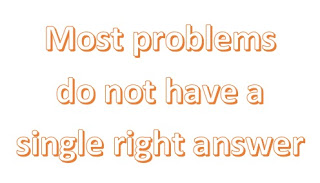

| Online: | |
| Visits: | |
| Stories: |

| Story Views | |
| Now: | |
| Last Hour: | |
| Last 24 Hours: | |
| Total: | |
The one right answer fallacy
By Brian Clegg
I managed to irritate someone the other day. (You don't get any points for saying 'I'm not surprised,' at this point.)
I received one of those emails you get occasionally from mailing lists you signed up to years ago, when life was very different. Back then, I was still involved in giving creativity training, and this was a creativity kind of newsletter. In it, the author had included a logic problem, which I shall reveal in a moment.
Now, I've always been a little suspicious about logic problems when it comes to creativity. A great example is the old chestnut about the person who gets the lift down to the ground from his 20th floor apartment every workday. On the way home, he gets the lift up to the 14th floor and walks the rest of the way. The question is 'Why?' And the answer you were supposed to give was 'Because he's very short and can't reach above the 14th floor button.' When doing creativity training, I've always subverted this and given away that solution, instead asking for ask many other solutions as we can come up with. We usually manage at least a dozen, equally good alternatives.
I would suggest the traditional way of using the problem, where there is a single right answer is about as anti-creativity as it's possible to get. So whenever I'm presented with a logic problem, I try to come up with an answer that the person who devised the problem did not expect. You may, or may not agree, but I see this as the only way to be creative with this kind of thing.
So, the problem in the email was called the 'Three Person Problem' and went like this:
There are three adult people. Andy is looking at Betty. Betty is looking at Chris. Andy is married. Chris is unmarried. Is a married person looking at an unmarried person?
a) Yes
b) No
c) Impossible to say.
Most people get this wrong. Please email me for the answer.
Now, I confess that 'Most people get this wrong,' was a red rag to a bull, as it implied immediately that there was only one possible answer. So I emailed back:
I suspect it may not be the answer you want, but one correct answer is definitely c) Impossible to say
This is because you make two separate statements. ‘There are three adult people.’ and then a series of comments on Andy, Betty and Chris. However, you don’t say that Andy, Betty and Chris are the three adult people mentioned in the previous sentence. If Betty were a child, she is arguably neither married nor unmarried.
The reply that I got was the somewhat grumpy:
Don’t be obtuse.
The answer is a) Yes.
Betty is either married or unmarried. In either case a married person is looking at an unmarried person.
There's certainly nothing wrong with this answer, but it is the boring expected one – it's certainly not creative.
I tried to explain:
Not being obtuse at all. The trouble with these kind of logic problems is that they are almost always phrased badly, so that they are susceptible to outside the box thinking. In this case a) is the obvious desired answer, c) is the much more creative answer, given the phrasing of the question.
But that didn't go own well either:
The phrasing of the question is perfectly clear – for any English speaker.
I had to have the last word and finished with a below the belt jibe about not being able to dispute my grasp of English, before emphasising that 'to be honest this entirely misses the point. You weren't giving us a use of English problem, but a logic problem in the frame of creativity. Logic requires precise wording. Good creativity, rather than ploddingly following the “right answer” looks for all possible ways around a problem. By using strong logic it was possible to provide a much more creative solution than the one you were hoping for.'
Whether or not you agree with me about the specific problem, I hope you will agree that solving logic problems is not of itself creative – it's only when you avoid the obvious that you can do something interesting.
Now Appearing is the blog of science writer Brian Clegg (www.brianclegg.net), author of Inflight Science, Before the Big Bang and The God Effect.
Source: http://brianclegg.blogspot.com/2016/04/the-one-right-answer-fallacy.html



